Search Results for: scriptshadow 250
Genre: Drama
Premise: Courted by colleges and sponsors alike, a burnt-out tennis prodigy fights to maintain dominance against her Academy rival as she hurtles toward the existential decision of turning Pro–a choice that will force her to double down on her dream or walk away from the future she’s fought for.
About: This script finished with 6 votes on last year’s Black List. Zachary Joel Johnson was an assistant at Skydance, Scott Free, and Dreamworks Animation.
Writer: Zachary Joel Johnson
Details: 103 pages
 Iman Vellani for Faheema?
Iman Vellani for Faheema?
I’ve been saving this one.
If you’re a new Scriptshadow subscriber, this is where I tell you I used to teach tennis. And, oddly enough, I get at least two tennis scripts a year to review. I’m not sure why the sport is written about so much. It’s inherently boring. I mean how do you tell a story about a sport that nobody in the world understands how to score????
If Player A has Ad-In on match point and the audience doesn’t know what “ad-in” or “match point” means, there’s literally no way to convey the drama. This is something Elad (writer of the other Black List tennis script on the list – Court 17) and I spent hours upon hours discussing while developing that script – how much we should teach the audience. Or if we should just leave it. It was agonizing to discuss and reminded me why I get so frustrated whenever I encounter a tennis screenplay.
The solution is probably to do what Challengers did. That’s the last tennis script I reviewed on the site, the one that stars Zendaya. The script was less about the tennis and more about the dirty love triangle at the center of it.
Believe me. I want this script to be an ace. Because if it is, it means the next 90 minutes is going to fly by. If it isn’t, it means the next 90 minutes is going to feel like the first 10 minutes of The Seeker, which felt like 10 years.
Ya follow that?
Faheema Nassar is an introverted 17 year old tennis prodigy who just won her first professional tournament. However, despite her coach, Bebe, and father, Omar, wanting her to turn pro, Faheema is reluctant. If you turn pro, you can never play college tennis, and Faheema wants to play tennis at Columbia.
So she rejects the prize money and heads back to her tennis academy in Florida to train. There, she’s met with a new face, 19 year old mean girl, Caroline Werber. Werber is only here because Faheema is the best junior talent in the world. By playing alongside her, people will notice Caroline.
Soon after, Prince Rackets shows up and wants to sponsor Faheema. Again, if she does this, she can’t play college tennis. So she’s reluctant to sign. Also, they’re barely giving her any money. Faheema realizes that if she wins the 18s Nationals, that gives you a wild card slot into the U.S. Open. Prince would have to double their offer if she pulls that off. So that becomes her goal.
The problem is, everyone there is obsessed with Faheema and works her to death. She’s getting burnt out. If that isn’t bad enough, Caroline keeps talking her down, telling her she’s worthless, trying to destroy her mental game. And then you have a former Russian Wimbledon champ coming in to train Faheema who’s even more of a c**t than Caroline! If Faheema can somehow survive all this pressure, she can begin her promising career. The question is, does she want to?

Tennis players are actually interesting people.
They tend to be loners at heart. They’re introverted. They’re socially awkward. As a tennis instructor, I can confirm that the kids who the parents brought to my classes were never the cool athletic types. They were always the kids who were a little bit “off,” lol.
I think that’s what Johnson is trying to capture here with Faheema. She’s anxious, socially awkward, introverted. Unfortunately, this combo makes her unlikable. She’s a super downer who never smiles, is never happy, who never likes playing tennis, who doesn’t make an effort to connect with anyone, who doesn’t like any of the people who train her, including her own father.
Why would we root for someone like that?
This is the crux of screenwriting here people. Forget that this is a tennis script. It could be a superhero script, a guy-with-a-gun script, a comedy, a Western, a buddy-cop flick — IF WE DON’T LIKE THE MAIN PERSON WE’RE FOLLOWING, NOTHING ELSE MATTERS.
And I think too many writers craft their protagonists without that in mind. To them it’s like a mound of clay that you shape on a whim. If it works it works. If not, it doesn’t. Oh well. Screenwriting starts with making the audience care about the main character and I just don’t see any strategy at all in this script to achieve that.
I’m not even sure what the central conflict is for our main character.
She’s torn between turning pro or playing for Columbia. Why does she want to play for Columbia? Columbia doesn’t even have a good tennis team (which is noted in the script). So why is that so important to you? That question is NEVER answered. It almost seems like Johnson confuses the fact that turning pro means you can’t play in college OR go to college. But that’s not true. You can go back to college after playing on the professional tennis tour. You just can’t play on the tennis team. So what’s really at stake here with this choice of Faheema’s? As far as I can tell, nothing. And it’s supposed to be the central conflict in the script.
This means we have a character we don’t root for in a situation with weak stakes. That’s a bad combo. It’s hard to create something good out of that scenario.
You need to create stakes that hold up in the real world. For example, Faheema decides she’s going to play the Nationals in the hopes of winning in order to double her contract offer from Prince. But what does that really mean? She’ll make 160 thousand dollars instead of 80 thousand.
You have to think about these things from the perspective of the reader. Is the reader really going to say, “Oh man! I was not interested when she was only going to make 80 grand. But now that she’s going to get 160 grand?? I’m all in. I really want her to succeed!!!” Stakes have to feel giant in movies. They can’t be casual. They can’t be ‘sort of big.’
The best aspect of the script was probably the relationship between Faheema and Caroline. Caroline, by the way, had actual stakes attached to her actions. She was 19. She was going to stop getting funded by her parents unless she made the tour. So she needed to win the Nationals to get that wild card or else she’d be forced to quit tennis. THOSE ARE STAKES. Why didn’t we have stakes like that for Faheema?
But anyway, seeing how cruel Caroline was to Faheema provided an ample amount of conflict within the tennis academy. And there’s a nice moment late in the movie where Caroline finally apologizes for being so awful to Faheema. But even that storyline suffered from Caroline being a two-dimensional character for most of the movie (she’s Mean Girl To The Max whenever she walks in the room).
Unfortunately, this script does not give me hope that tennis scripts are now easy to write. Challengers is still my number 1 script. Court 17 is number 2. Everything else is a distant third.
[ ] What the hell did I just read?
[x] wasn’t for me
[ ] worth the read
[ ] impressive
[ ] genius
What I learned: Sometimes, how you want to portray your protagonist makes them unlikable. And it’s your job to recognize this and decide if that’s really want you want to do. For example, if you want to create a story around a really depressed person, well, depressed people aren’t likable. So you either need to have a plan to make them likable or you need to scrap your idea entirely. — It can be done by the way. Making a depressing person likable. Sometimes it’s as simple as giving them a sense of humor. Faheema smiled once in this movie. The final line of the script! Just have her crack some jokes. Have her have fun. If your character is down all the time, I PROMISE YOU we will not like them.
******REMINDER – NOVEMBER LOGLINE SHOWDOWN COMING UP!******
We’re moving our normal Thursday deadline back a week due to Thanksgiving. So if you have a great logline and you want to compete in the Logline Showdown, send that entry in! You’re got until a week from Thursday.
What: November Logline Showdown
Send me: the logline for any script you have (features will take precedence over pilots but if you’ve got the best tv show idea ever, send it in)
I need: The title, genre, and logline
Also: Your script must be written because I’ll be reviewing the winning entry the following week
When: Deadline is Thursday, November 30th, 10:00pm Pacific Time
Send entries to: carsonreeves3@gmail.com
Okay, let’s get down to business.
I like superhero films.
 The Marvels looking at their second weekend drop.
The Marvels looking at their second weekend drop.
I do.
With one caveat.
They actually have to be good.
And I don’t think anyone in the industry has cared about making good superhero movies for a while. I think that they believe they’re trying their hardest. Nobody starts out trying to make a bad movie.
But over-saturation combined with the prioritization of message-over-concept has shot a poison arrow into Marvel’s magical money-generating organism and the damage is so severe that they can no longer continue with this strategy. Unless their goal is to hemorrhage every single money-generating artery in their body.
It’s long been known that opening weekends are not representative of how good a movie is. Second weekends are. Opening weekends are about concept and marketing. If you have a well-known superhero in a fun-sounding movie and a 100 million dollar marketing campaign, you are guaranteed a huge weekend, regardless of how good your movie is.
But second weekends are all about word-of-mouth. If people are coming back from the theater and bashing your movie or, worse, not talking about it at all, no one’s going to show up the second weekend. The Marvels had the biggest second weekend drop in Marvel history, with 80%. This, just several months after the previous Marvel film, Ant-Man 3, had the biggest second weekend drop (70%).
These are not good numbers. And I’m hoping that this is a wake-up call for everyone. I don’t think we should stop making superhero films. If that happens, I’m afraid the theatrical business might crumble entirely. But we should stop making second-tier superhero films. For example, the next Marvel entry – and the only one of 2024 – is Deadpool 3. That movie’s going to be awesome! Because it’s got a premier superhero at the helm.
It’s no secret why Batman and Iron Man started this movie superhero obsession. Their value had been established via millions of sold comics. So why should we be surprised when these smaller unestablished comic book heroes (Blue Beetle) don’t pull in the same amount of dough?
That’s what was so strange about The Marvels. The first film grossed a billion dollars. So you would think people would’ve shown up for the sequel. Why didn’t they? For one, the first film had a way better premise. This was back when Marvel was wisely exploiting sub-genres to provide templates for their screenplays. Captain Marvel was a buddy-cop movie. And using a younger Nick Fury as the other half of the team-up was a fun idea.
The Marvel’s biggest problem was that the concept was ill-conceived. Why are you downgrading your billion dollar superhero star for her sequel? That was a really odd choice. When people saw this trailer, they no longer saw “Captain Marvel.” They saw Captain Marvel playing second fiddle to the lowest rated Marvel TV character as well as the single most forgettable superhero in history. Who came up with that idea? If anything, Captain Marvel should’ve graduated to riding solo in her sequel. A billion dollars certainly earns you that, don’t you think?
Maybe they were concerned about Brie Larson’s likability. The Brie-ster is an odd duck. I think she has a good heart but she comes off socially uncalibrated so she’s got a bigger share of haters than your average celebrity. The girl who plays Ms. Marvel is certainly more likable than Brie. So I can see why they were able to talk themselves into putting her into a Captain Marvel sequel. But nobody knows who that character is!
And let me just say something screenwriting related, as it appears that everyone in the superhero business has forgotten about this. Rules are important. With superheroes, it is imperative that we know the rules of their powers. The more vague someone’s power is, the less we care about them. There are a couple of minor exceptions to this. But it is otherwise a hard and fast rule.
Spiderman, Batman, Superman. The most popular superheroes ever. What’s the concurrent numerical element? We know the rules behind their powers. And they’re simple. There’s nothing vague or unclear. Contrast that with Captain Marvel. Do you know what Captain Marvel’s powers are? I don’t. I certainly don’t know her biggest weakness. Which means she’s unstoppable? Is that interesting? And I know even less about the other Marvel girls’ powers. So you’re asking a bunch of people to show up to a superhero movie where we don’t understand any of the characters’ superpowers??!!
The new Hunger Games movie didn’t open much better than The Marvels (55 mil) but it cost half as much. So you have to consider The Ballad of Songbirds and Snakes a mild success. But the film could’ve opened much bigger had it understood one of the core principles of screenwriting: A clear concept.
Are you seeing a theme here? Clear rules on the superpowers. Clear concepts. Clear clear clear clear clear clear clear. Too many screenwriters throw clarity out the window. They think they can jam in as many ideas and plots and characters as they want and it will all work out. That’s not how this works. Especially if you’re writing for the masses – you need to be simple and clear.
I bet I could ask 100 people, after they watched The Ballad of Songbirds and Snakes trailer, what the plot was and 95 of them would have no idea. That’s a problem. I know it’s a nuanced conversation in that you’re working with IP and, therefore, are betting that people are going to show up due to their familiarity with that IP. But the super successful movies are not ones that only cater to their fan base. They’re the ones that break out and pull in the average moviegoer. And for those additional seat-butts, you need a clear story.
Look at how simple and clear the number 1 movie of the year was: Doll living in her doll world goes into the real world. That’s it. Fish-out-of-water. We understand it immediately.
As for the rest of the top 10, “Thanksgiving” did okay with 10 million. Mixing up horror and Thanksgiving is one of the stranger genre choices I’ve seen in a while. But hey! Some people went to see it, so cool. Oscar-hopeful The Holdovers is squeaking by. The highly-rated film is struggling to pull people in as it is only making $1800 per theater (for comparison’s sake, The Marvels’ per theater average was $2500). You can read my review of the script here.
But the film that’s really struggling is Taika Waititi’s, “Next Goal Wins” ($1100 per theater average). Here’s the thing with Taika. At heart, he’s a goofy guy. But he’s one of the few goofy writer-directors who’s earned a level of critical acclaim, especially with JoJo Rabbit. So we hold him to a higher standard. Therefore, when he makes his version of The Mighty Ducks, it all seems a bit juvenile. I think people are confused. They were hoping for something more from him.
But I just watched an interview with Taika and he doesn’t want all this serious stuff. He would prefer to goof around. If you’re Taika, I say go back to your roots and make another movie with Jermaine Clement. I can practically guarantee that it will be great. If you haven’t seen Eagle vs. Shark, do yourself a favor, cancel everything you’re doing today, and rent this movie. It’s awesome.
I was going to head out and see Saltburn this weekend, Emerald Fennel’s follow-up to Promising Young Woman, one of the best scripts I’ve read in the last five years. But the reviews scared me off. It seems to be hovering near 70% on Rotten Tomatoes. These indie movies cannot have sub 80% RT scores. They have to be at least close to the 90s. By the way, this is another Jacob Elordi movie. Elordi is the Australian hunk coming out of Euphoria. He was also cast in Priscilla. Common denominator with these two films? Female directors. The ladies love this guy. He’s primed to be the next big movie star. He and Paul Mescal are going to be fighting over those top leading man roles for the next couple of decades.
Have you seen any good movies lately, at the theater or on streaming? If so, share them in the comments! I’m always looking for something good. I rented Equalizer 3 this weekend and the Italian backdrop spices things up a little bit (what a fun opening scene). I would’ve preferred a faster-moving narrative but it was still solid.
Genre: Holiday
Premise: At the height of the holiday season, two strangers team up to rob one of New York’s most famous department stores while accidentally falling in love.
About: Today’s script finished high on last year’s Black List, with an ornament-busting 12 votes (“On the first day of Christmas, my true love gave to me, 12 votes on the Black List…”). The writer, Abby McDonald, has one writing credit. But it’s a big one. She was a staff writer on the mega-successful Netflix show, Bridgerton.
Writer: Abby McDonald
Details: 110 pages

Somehow. Some way. The holidays are upon us.
I like what McDonald is going for here. The holidays have been overwhelmed by the Hallmarking of movies. McDonald is adding a real genre to her Christmas concept. We have a heist film on the most wonderful day of the year.
28 year old New Yorker, Sofia, is scoping out one of the city’s most opulent department stores, Sterling & Co. As she scans the place, she runs into 32 year old Nick, a charming fellow who seems to be doing the same thing. And Nick doesn’t like that.
So tells Sofia to leave the store and stop thinking of doing whatever she’s thinking of. We follow Nick home and find a bunch of goons waiting for him. Nick owes these men a lot of money. Which is why he’s planning to rob Sterling & Co. on Christmas Eve, when they’re going to have alllllllll that holiday money in their safe.
Back to Sofia, who’s visiting her mother at the hospital. Her mom, who used to work for Sterling & Co. for 20 years as a cleaner, had a stroke on the job. But the evil company claim they fired her a day earlier to avoid paying her medical costs. This is why Sofia wants that safe money – to pay her mom’s medical bills AND stick it to the man!
Eventually, Nick learns about Sofia’s mom, which means he could have access to 20 years of experience in this department store. He’ll know every unlocked door, every corner out of camera sight. He may just be able to pull this thing off! But that means, unfortunately, teaming up with Sofia. Seeing as the two kind of hate each other (but kind of love each other too), it’s a dangerous move. But it’s the only move he’s got!
Whenever you write a script, you’re trying to create the best version of that script-type that you can. If you’re writing a horror script, you gotta give us some of the best scares we’ve ever seen. If you’re writing a comedy, you gotta give us some of the funniest scenes we’ve ever watched. And when you’re writing a con man/con woman heist script, you gotta give us amazing quick dialogue and incredibly clever moments.
What most writers will do, and what I’d argue today’s writer does, is give you just enough but nothing more. So, here, we have an early exchange where Sofia and Nick engage in some witty banter at the department store. Nick looks like he came out on top. Then, several scenes later, Nick checks his pocket and instead of finding the security pass that he took from Sofia, he finds Sofia’s library card instead. Zoinks! She lifted it from him.
I’ve probably read somewhere in the vicinity of 250 of these sexy heist team-up scripts and this exact moment was in 240 of them. That’s when you lose me. The goal when writing any script should not be to meet the standard. The goal should be to exceed the standard. You may not have the chops to exceed the standard, but you should always try. Especially when it comes to those things that are important to that genre.
Dialogue is so important to this genre. It’s got to be sexy and biting and quick and clever. If it’s ANYTHING LESS THAN THAT, your script is toast.
I was just telling a writer this the other day. Every time you read through your script, whether it be to spell check or look for plot holes or see if your characters are working, improve three to four lines of dialogue. Most writers will read through a script 200 times before they send it out into the world. If you’re improving 3 to 4 lines of dialogue every one of those read-throughs, you’re gonna have some really good dialogue when it’s all said and done. If you don’t do this, you’re going to have average dialogue.

On the plus side, I liked how McDonald understood that a straight heist wasn’t going to be enough. This is true for all heist scripts. You can’t put the heist in the third act and spend the entire second act preparing for it. You need to create some additional plot threads, and McDonald does that here.
For example, they want access to the key codes that are going to get them through all of the doors in the store. So they try and steal them from the store president’s soon to be ex-wife. But then the wife catches them and wants in. So now, they need to steal an additional thing for her along with the original loot. This additional object is then used as a way to create double crosses and plot surprises later on.
Another thing I give McDonald credit for is that these characters become more likable as the script goes on. This happens to me ALL THE TIME. Every time I read one of these scripts, I initially find the main characters too polished and too slick. There’s no authenticity in their interactions. It’s more about saying the too-cool-for-school line. But once the plot kicks in and the characters actually have something to do besides talk, they grow on me. Maybe this is yet another example of the power of SHOWING NOT TELLING. It’s the characters having to act that pulls me in. So by the time these two were in the heist, I was engaged. Just not engaged ENOUGH.
My advice if you’re going to write a heist screenplay is to stay away from a straight, sexy thriller, unless you’re one of the best dialogue writers in the world. Because these movies are all about the banter between the two main characters, as well as the sexual tension underneath that banter. You can’t control the latter, because that will be up to who they cast. But you can control the former.
If you’re not great at dialogue but you still want to write a team up heist screenplay, I would suggest going in one of two directions. One, come up with a clever setup. Bad Santa comes to mind. Bad Santa is the same movie as this, but it has the more clever set up of a guy dressing up as Santa Claus to work department stores specifically so he can rob them.
Two, come at the genre in a unique way. Try to find an angle that hasn’t been done before. Parasite comes to mind. Parasite is a heist film about a family who steals a home from another family. We’ve never seen anything like that before so it’s a really interesting way to play with the genre.
You can certainly play it straight like this script. And, in McDonald’s defense, this is the most marketable of those three movies I just mentioned. But it’s also the variation that’s most susceptible to cliché and that’s where the majority of this script exists – in cliche.
[ ] What the hell did I just read?
[x] wasn’t for me
[ ] worth the read
[ ] impressive
[ ] genius
What I learned: Prioritize the things that are important to the genre of script you’re working in. We all have a finite amount of time. We can’t work on a script forever. Which means you’ll have to prioritize what, in your script rewrites, to focus your time on. Your priority should always be the elements that are particular to that genre. So if you’re writing a comedy, spend 80% of your time improving your jokes. If you’re writing a horror script, spend 80% of the time trying to make it scarier. If you’re writing an action movie, spend 80% of your time on your action set pieces. And if you’re writing a sexy heist thriller, make sure the dialogue is electric, that we love both of the leads, and we’re desperate to see them get together.

Reviewing “Seven” in my newsletter brought me back to a time when screenwriters could change their lives overnight. All they had to do was a write a good screenplay and – BOOM – they were millionaires.
Those sales then did double-duty for them, as their names would be splashed all over the trades. This would result in everyone in town wanting to meet with them. Which would establish contacts for these writers that they could use to write high-paying work for the next decade.
What happened to that world and how can we get it back?
A number of things happened. For starters, the internet screwed up the agency’s con. A big part of how scripts got sold in those days was that an agent would send a script out (hard copies, remember, not pdfs) to 7 studios and because all parties were isolated from one another, studios would freak out, afraid to lose a hot spec to a competitor, and therefore bid on that script out of fear, regardless of it it was any good.
Once the internet arrived, Roy Lee, a producer now at Warner Brothers, created an online chat room where assistants could share their thoughts on scripts. Therefore, when a script went out this time, it got photocopied quickly and, within hours, everyone was reading it. These assistants now had a central location to share their thoughts on the script, which would allow a quick consensus on if a script sucked or not.
And here’s the open secret about agency-endorsed screenplays (both then and now) – most of them are bad. Now, that badness was being exposed. So that previous strategy of scaring studios into bidding on bad material didn’t work anymore. This killed a lot of sales that would’ve gone through in the previous era.
Another thing that happened was that the studios all agreed not to share sale numbers anymore. They did this because the news stories about scripts selling for 2 million dollars were driving up script prices. So if you stopped telling people how much a script sold for, the trades were less likely to write a big story about them. And this would allow the studios to bring script prices down to a reasonable level.
I still don’t understand why agents agreed to this. It’s in an agent’s best interest to promote a big spec sale because it will get their client more work as well as themselves more money. The conversation may be more nuanced. I know that, sometimes, a script would sell for a lot less than expected and, in those cases, the agents would want the script price to be vague. That way they could hint that it was bigger than it was.
But just the fact that the trades no longer posted these numbers hurt the script sale business immensely.
But now we get to the biggest reason spec script sales plummeted – THE SCRIPTS WERE BAD. Go ahead and read some of these old million dollars sale scripts. Or just go back through my archives. They’re in there. These scripts were average at best. And so, when they got made, they didn’t make enough money. And when that happened enough times, the studios said, “We’re not following that carrot anymore. We know where that carrot leads.”
The inflection point was 2014’s Transcendence, with Johnny Depp. That was a spec script. That was an expensive movie. And it just SAT THERE. Nothing happened in that screenplay (which I erroneously gave a decent review to). So nobody showed up. And I specifically remember the drop-off of script purchases that occurred after that movie’s first weekend. And the market never recovered.
Which leads us to the post’s big question: How do we bring spec script sales back?
For one, trades have to write about them again. One of the reasons spec scripts became so big in the first place was all the stories that the trades would write about them. If someone sold a big spec, there’d be a giant Variety article that would go into detail about the writer – where he came from, how he conceived of the idea. It was exciting! I still remember reading that article about those valet guys who wrote a spec about valets that made a million bucks. Those stories drive interest in screenwriting. We need them. And nobody writes them anymore.
I’ve thought about writing them myself. But there is some conflict-of-interest. When I have made some calls to get info and developed relationships with those buyers in the past, it would get complicated when I would then have to review the script (or another script from the same production company). I’d notice that I was a little easier on the material than I would normally be. But it’s something I should consider because that sacrifice could be worth the industry having a place where they can consistently read the latest screenwriting success story. Let me know in the comments if you think I should do this. It might mean not being able to review those scripts, though.
We need to publish script sale numbers again. Agents and managers should be promoting those numbers like crazy. It’ll lead to their clients making more money on future projects! Which means more money for them! I don’t care if these spec sale prices are low at first (250 grand, 350 grand). They will grow over time if we keep our foot on the gas and keep writing about these sales.
But the biggest thing you, the writers, need to do is write THE RIGHT SCREENPLAYS and then do a GREAT JOB WRITING THEM. These scripts don’t only have to be as good as the mega-franchise movies. They have to be better. Cause they don’t have any IP behind them. So if you’re a studio taking a chance on one of these scripts, the script has to be really impressive.
Ever since the spec sale business died, the primary measuring stick for a screenplay has been The Black List. And The Black List has become the opposite of the spec sale business. It’s become the Nicholl Fellowship List. It promotes intellectual screenplays over commercial screenplays. It still serves the purpose of getting writers recognized. But it doesn’t help the spec sale trade at all.
To revive the spec sale trade, you have to start with the kind of movie template that actually makes money. Former spec script mainstays like Comedy (The Hangover), Dark Thrillers (Silence of the Lambs), Romantic Thrillers (Fatal Attraction), and Romantic Comedies (Notting Hill), have been relegated to streaming services. Which means you can still make money off of them. But it’s not going to be for a big paycheck.
The movies that spec writers can still write these days and realistically sell for big money include the Action movie (Beekeeper), Action Comedy (Spy), Horror (Us), Buddy Cop movies (Central Intelligence), Guy/Girl with a Gun movies (John Wick), Fun Slasher movies (Scream), Heist (Ocean’s 11), Biopics (Elvis), Based on a true story World War 2 movies (Saving Private Ryan), Contained Thrillers (The Mist), Fun Undercover Cop movies (the original Fast and Furious, Point Blank), Ensemble Big Concept (Knives Out) and to some extent, the general high concept script, as long as it’s upbeat and therefore would sell a lot of tickets (think Jurassic Park or Free Guy).
This is not to rule out updating old templates, like the Submarine movie (Crimson Tide), the Action-Crime movie (Heat), Hitchcockian Suspense movies (Gone Girl), The John Carpenter movie (Escape from New York), The John Hughes movie (elevated teen fare), the big-budget Western (The Magnificent Seven), the pirate movie (Pirates of the Caribbean). Or just that bonkers wowza idea that’s never been done before.
To be honest, you could still write a rom-com that sells for a million bucks *if* you find a clever way to reinvent the genre. Actually, that’s the best way to sell any script for a million dollars. Reinvent the genre. Reinvent any of the movie-types I listed above and you can be a millionaire. I’m not kidding.
Once you’ve got your concept, the hard work begins. This is where the article comes full circle because “Seven,” in many ways, is the perfect spec script. It’s not only a clever idea. But it’s one of the few spec scripts I’ve read where it’s clear that the writer gave 100% on every page. There’s zero laziness in “Seven.”
The core reason that the spec boom died out was that the movies that resulted from those scripts didn’t consistently deliver. And that’s cause the scripts were weak. Most of the value in those scripts was concentrated in the first act. Which meant audiences would go to the theater, enjoy the heck out of the first 30 minutes of the movie, then became increasingly bored with every passing ten minutes. They’d leave the theater with zero energy and wouldn’t recommend the movie to anyone.
So if you want to revive big spec sales, it’s up to you guys. It’s up to you as to how much you want to work on your screenplays. This is why I tell writers, field-test your concept so you know it’s good. Cause if you do that, you know you can spend a year making your script perfect (e-mail me at carsonreeves1@gmail.com – $25 for a logline eval). Cause you already know people are going to want to read it whenever you finish.
Then, get feedback after each draft (figure at least six drafts)! Figure out which characters aren’t working. Make them better. Figure out where readers are losing interest then upgrade the plot in those areas. Even out your tone with each successive rewrite. Stay open to new exciting directions you can take your screenplay, even if it means extending your original deadline. Your goal should be to write something where you can honestly say, “I can’t make this any better.”
The thing you will never be able to control is writing an objectively great screenplay. You just never know how people are going to react to a story. But what you can control is writing the best possible screenplay YOU’RE CAPABLE OF WRITING IN THIS MOMENT IN TIME. I felt that way with “Seven.” I don’t feel that with many other scripts I read.
Let’s change that.
Then let’s sell some damn million dollar scripts.
Last week over 250 writers sent me the first page of their screenplay. Only 6 of those made it to the First Page Showdown. Here are 10 that didn’t make it. I explain why.
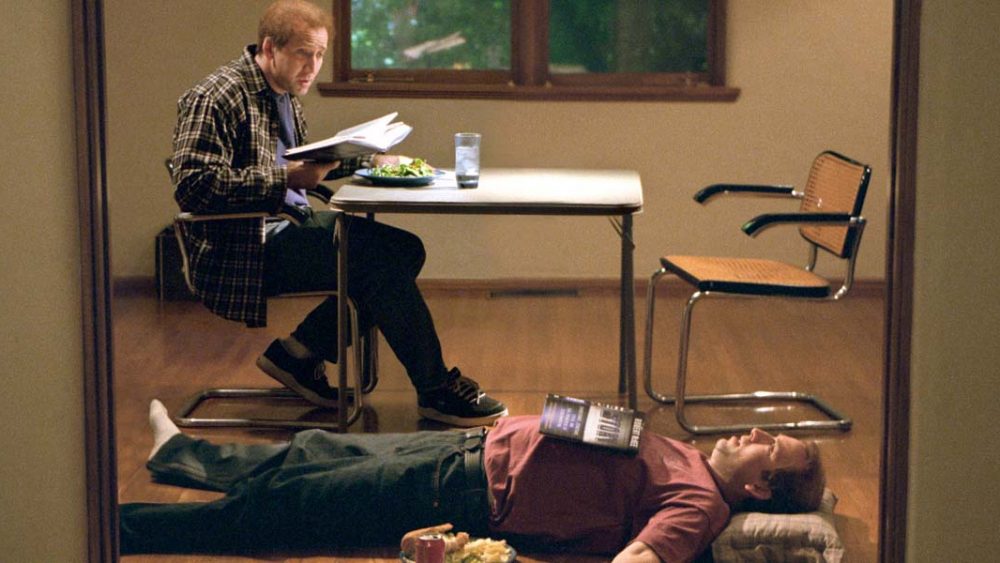
***SUPER DEAL*** I’ve decided to give out four SUPER-DEALS this weekend. If you’ve got a feature script or a pilot, I can give you 4 pages of stellar notes (with an emphasis on the first page if you want!) for $200. I’m giving out 2 of these with this post and 2 in the newsletter. To get one of the 2 slots here, e-mail me at carsonreeves1@gmail.com with the promo code: SUPER DEAL. Hurry up. They’ll disappear quickly! ***SUPER DEAL***
Okay, an update on the First Page Showdown. Our winner, Neobiata, it turns out, doesn’t have a full screenplay for his entry. I told him to write it over the next two months and I would review the script when he’s finished. But this is not going to become a regular thing. So don’t think you can start entering loglines into Logline Showdown and write the script later if you win. I’m allowing this because it’s the first time it’s happened and I’m feeling nice!
So I’ll review the second place script next week. I’m putting all of my focus on the newsletter right now, which is going to be a blast. After my Ripple review, someone contacted me who has access to a time machine, which they’re sending to me. It can only be used once and I have a really fun way to use it that I’m going to save for the newsletter. If you want to be on my newsletter list, e-mail me at carsonreeves1@gmail.com with the subject line, “NEWSLETTER.”
Okay, let’s take a look at some first page entries that didn’t make the cut. I want to take you through my thought process as to why they didn’t make the top six. Hopefully, you can learn something from the analysis. And feel free to tell me that I’m wrong and that one or more of these deserved to be in the competition!
TITLE: BELIEVER
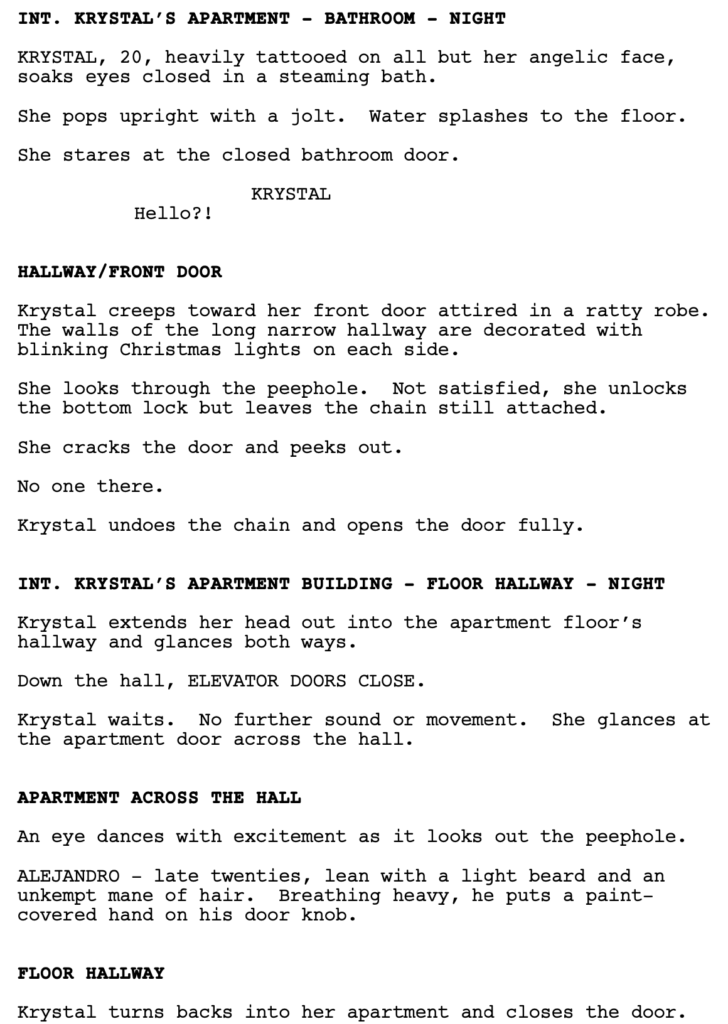
This one lost me at the very first line. “KRYSTAL, 20, heavily tattooed on all but her angelic face, soaks eyes closed in a steaming bath.” It’s too clunky of a sentence. There should be commas surrounding “eyes closed,” but there are not, which makes us read it as “soaks eyes,” which, of course, doesn’t make sense once you get to the trailing, “closed.” So you then have to reset to read the sentence correctly. If you’re making your reader do that on the first line, you’re effed. Very few readers are going to forgive you for that.
The scene actually has a potentially interesting situation going on. You’ve got a mysterious, maybe even threatening, person at the door. A suspenseful beat follows. But then things get confusing. It’s implied that whoever was at the door has left in the elevator. However, we also meet the tenant across from her with a clunky line of its own – “An eye dances with excitement…” – plus I’m not sure if we’re in his apartment (since “APARTMENT ACROSS THE HALL” is presented as a slugline) or we’re still in the hallway. This page could be smoother.
Logline (Thriller): An alcoholic with a history of mental illness escapes a murderer and then fights to make sense of her fragmented “visions” in order to save the next victim before the killer’s twelve-hour deadline.
TITLE: 10 CENT BEER NIGHT
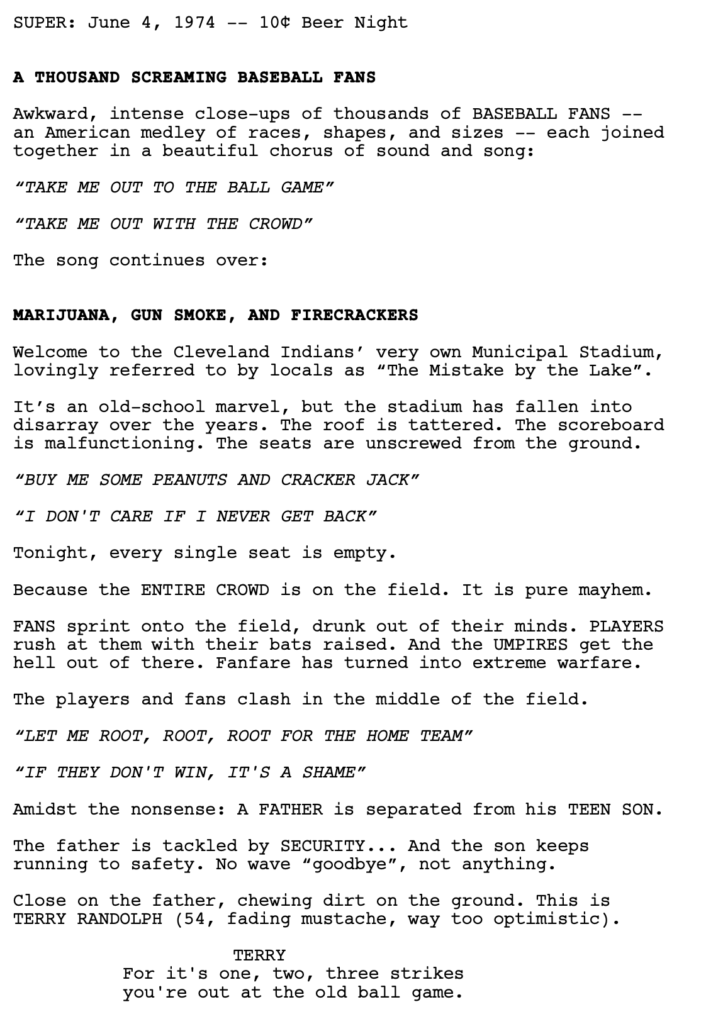
This was actually a pretty good page. Something is going on. The writer does a solid job creating a visual scenario. But as I attempted to consider whether to post it, I read it again and I noticed that something was missing. I couldn’t figure out what it was, at first, but it finally came to me. There was no character to latch onto in the scene. I felt like I was watching everything from a thousand feet above. Later on the page, we do get a dad and his son. But, still, we don’t know these people. They’re not even given a name. So I still feel nothing in a scenario where I should feel everything. This is an interesting premise, though. I would encourage the writer to rewrite this first page and use a character to put us into the mix so that we FEEL what’s happening.
Logline (Comedy): When a well-meaning father tries to celebrate his rebellious son’s 18th birthday, they incidentally attend the most disastrous event in baseball history — Cleveland’s 10¢ Beer Night — and must contend with a crowd of streakers, drunks, and all-out barbarians to survive the night.”).
TITLE: NASTY NEW YEAR
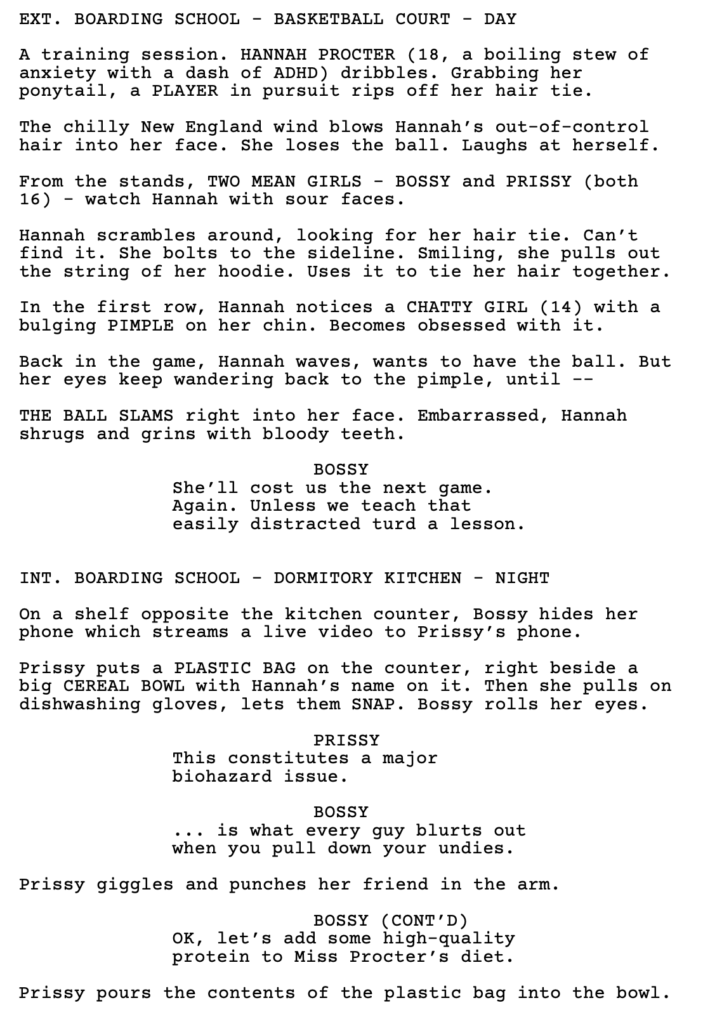
Sometimes it’s one mistake that does you in. That was the case with this page. Here’s where I officially gave up on the entry: “In the first row, Hannah notices a CHATTY GIRL (14) with a bulging PIMPLE on her chin. Becomes obsessed with it.” What does this have to do with anything? You’ve just shown a character lose her focus, then hurriedly regain it in a basketball game… why the random shot of a girl with a pimple and our heroine obsessed with her? I’m now imagining a scene where my heroine is standing in the middle of a game staring at a girl with a pimple in the stands. Maybe if there was a reflective windowed door and our heroine caught her own reflection and saw a pimple on her own face, maybe I could see her becoming obsessed with that. But becoming obsessed with a random fan’s lack of a skin care routine makes me think there are going to be a ton of random moments in this script. I have no interest in that. I like focused narratives with clear plots. This doesn’t appear like it’s going to be that.
Logline (Horror): An anxious young woman whose body has been secretly prepared since childhood to become another mind’s host on New Year‘s Eve must outsmart the devious parasite-to-be – her anti-aging obsessed mother.
TITLE: DERANGED
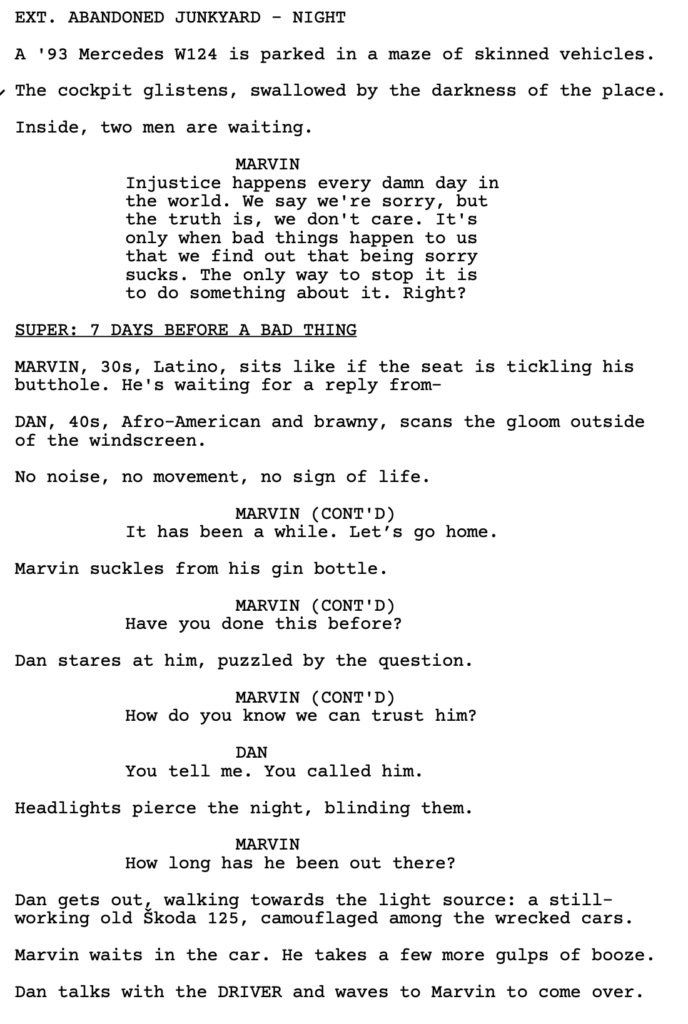
I don’t know what a Mercedes W124 is. So I’m already behind the writer. I don’t know what “skinned vehicles” means. Like their paint is stripped off? I don’t know what, “sits like if the seat is tickling his butthole” looks like. Does that mean he’s having an uncomfortable experience? A joyful experience? Either way, it’s not a good description. To the writer’s credit, they’re creating a bit of suspense here. We want to see who these guys are waiting for. But a lack of clarity in the writing followed by an ill-informed line of description told me that I was going to be getting a lot more of those things if I kept reading.
Logline: A quiet, vengeful husband puts his family in a life-or-death situation when he targets the prime suspect in his wife’s murder: a ruthless Mafia hitman.
TITLE: HALL OF FAME
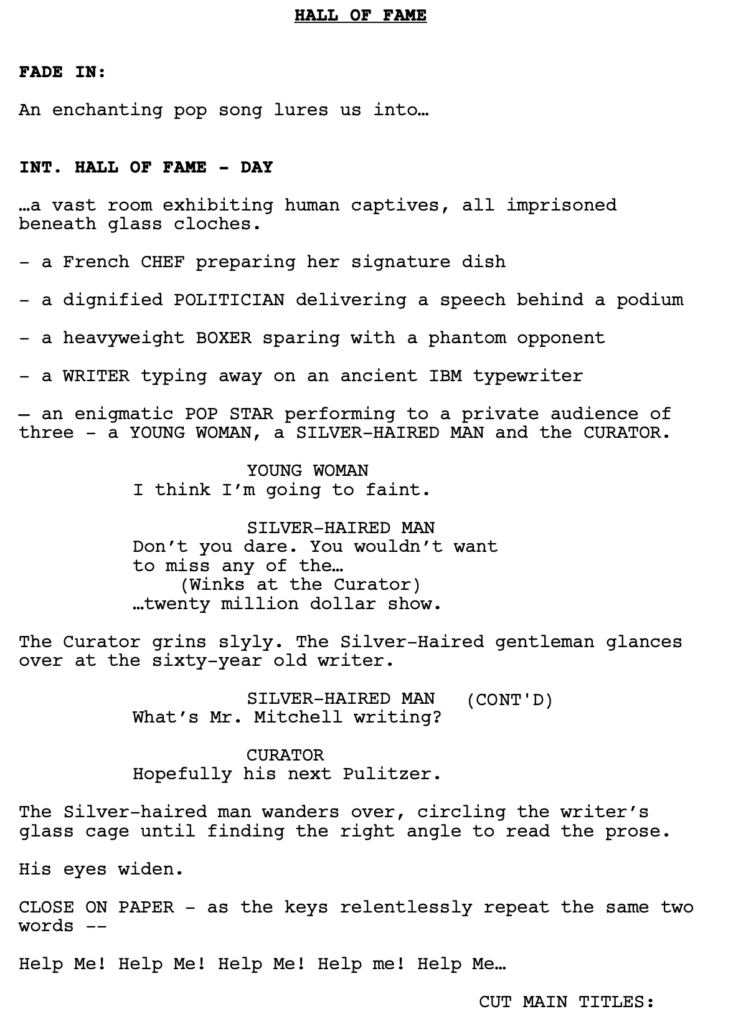
When I see, “Hall of Fame,” I’m thinking ‘sports.’ So I didn’t understand where I was or what was going on at first. In all of my life, I’ve never read the word ‘cloche’ before. You can get away with that sort of thing sometimes, if the word doesn’t matter. But this word is pivotal to the reader understanding what’s going on and since no reader will ever give you the courtesy of looking a word up, you’re pretty much screwed right there.
I was still willing to give the page a chance but then we get “sparing” instead of the proper word, “sparring.” And now you’re really dead. I’ve gone from confused to never seen that word before to wrong word. This is why feedback is so important, guys. You need somebody telling you these things so that you’re not killing your opportunities. Cause a screenwriter can spend five years getting to the point where a legitimate person agrees to read their script and they come into that opportunity like the Chicago Bears, down 31-0 in the first quarter. You can’t recover from that.
Logline (Horror/Thriller): When a popular news anchor is abducted and imprisoned in a macabre gallery filled with celebrity exhibits, she must exploit her own fame as both a weapon and a means of escape.
TITLE: HEMMVILLE CREEK
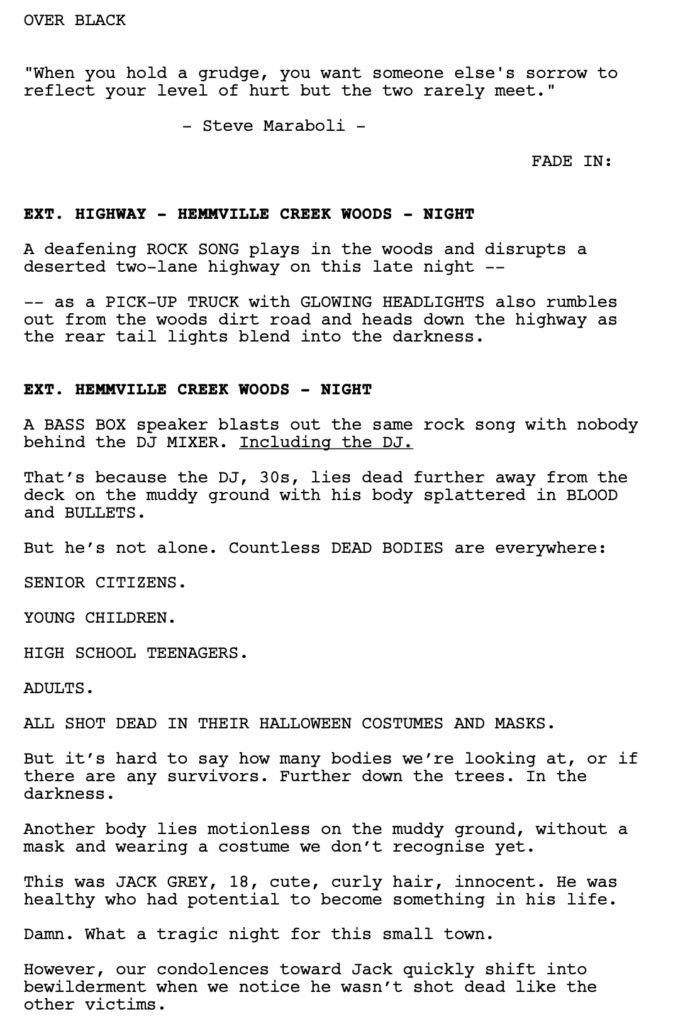
Sometimes, writing just isn’t easy to read. This has nothing to do with screenwriting per se. It’s more about writing in general. If I’m doing double-takes on basic sentences, that’s a problem. This second sentence here: …“as a PICK-UP TRUCK with GLOWING HEADLIGHTS also rumbles out…” Why, “also?” “Also” shouldn’t be a part of this sentence. “…from the woods dirt road…”. That doesn’t make sense. Later on the page we get, “He was healthy who had potential to become something in his life.” That’s a massive writing error on your first page! If this is what we’re going to get on page 1, the page that the writer pays the most attention to, then we, as readers, know that we’re going to get a lot more of that if we keep reading. So you gotta clear things up. Because, other than that, there’s something big going on here. There’s some potential to grab the reader with this opening. But if they’re fighting through the sentences, they can’t appreciate the story.
Logline (Whodunnit/Thriller/Drama): After her innocent 18-year-old son becomes the prime suspect to a Halloween party massacre in their small town, a Sheriff only has 13 hours to find the real killer before the FBI arrive and take over.
TITLE: DON’T SEND HELP
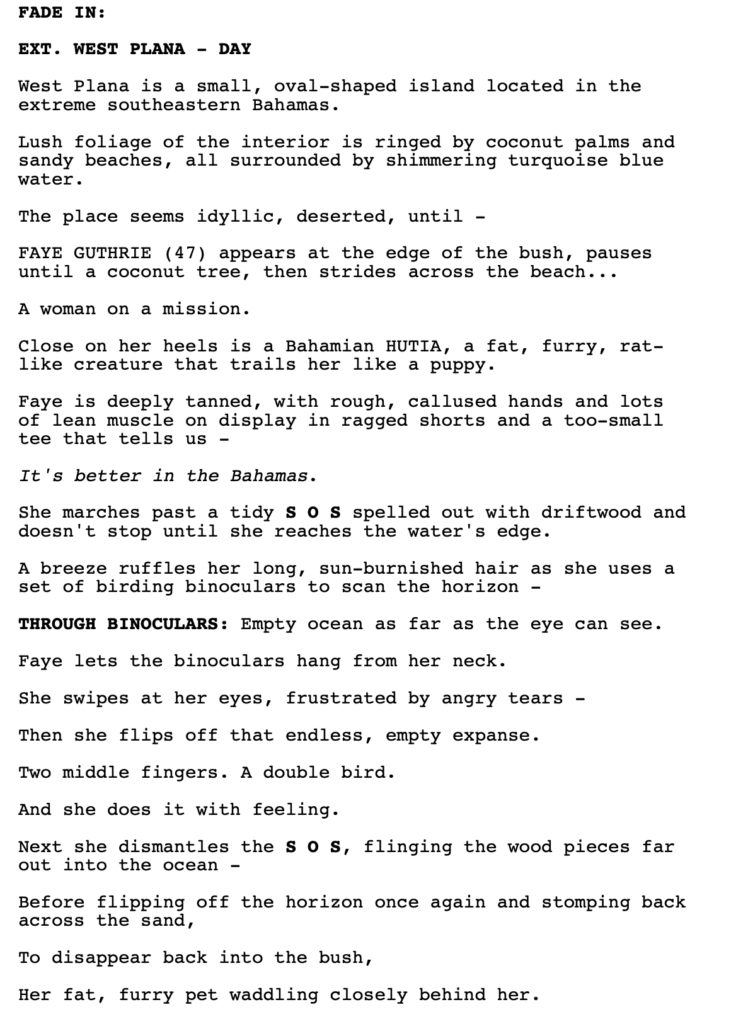
This is, actually, a solid page. I had about 250 entries. I’d put this in the top 40. Maybe top 30. We are establishing something interesting – which is that this woman is stranded on an island. That alone is worthy of getting people to turn the page. But is it the best opening Steph could’ve gone with? That’s debatable. Cause there’s nothing going in the scene. It’s a scene that is, solely, establishing information. It’s not doing so via any kind of dramatic situation. For example, if we started on this character sprinting through the jungle as we try and figure out why she’s doing so (Is she running towards something? Running away from something?). Then we hear a noise (a boat horn or a plane, maybe) and she emerges onto the beach (and this is where we realize she’s stranded on an island), she runs to the water to try and signal the passing vehicle. You’ve established the same thing you’ve established on the page you already have. But you’ve added a dramatic element. Or you can pull a reversal. Start on our heroine tanning in paradise. Establish the peaceful beauty. Then, ever-so-slowly, pull away from her, gradually establishing the beaten-up beach, the SOS sign, some remnants of former temper tantrums, until we realize she’s stranded on an island. Way more interesting than an on-the-nose, “FU” to the world for being stranded here.
Logline (Survival Drama): When a devoted wife and mother is rescued after being marooned on a deserted island for six months, her family is forced to reassess old behaviors, given that she’s lost her taste for living a normal, civilized life.
TITLE: HARD DOLLAR
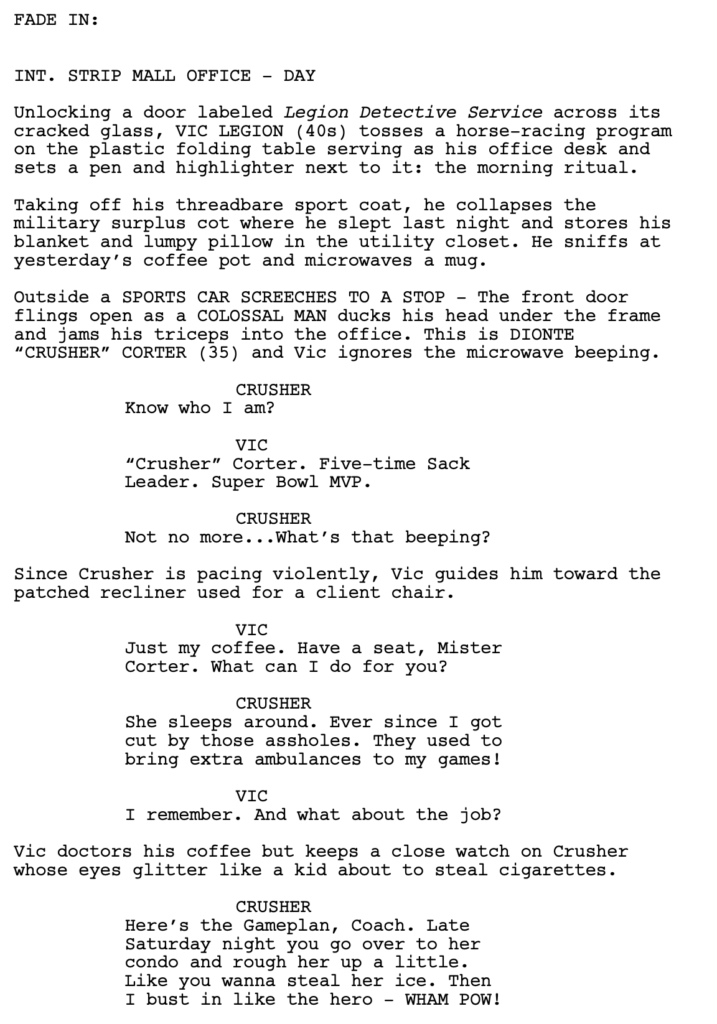
A couple of issues stick out to me right away. You’ve got three blocks of 4-line paragraphs. That’s going to agitate a lot of readers. Readers like to see white space. Not big chunky blocks of text right away. Another issue is one I see a lot, which occurs in the very first line: “Unlocking a door labeled Legion Detective Service across its cracked glass, VIC LEGION (40s) tosses a horse-racing program
on…” Notice how this line reads backwards. An action occurs before we’ve met the person performing the action. If you do that enough, it’s uncomfortable to read because we’re only forming an image AFTER the sentence, instead of right away. Instead, keep it basic. “VIC LEGION (40s) unlocks a door labeled ‘Legion Detective Service’ across its cracked glass.” It’s simple changes like this that make a big difference. I’d also try and give us a more unique opening. A guy shows up to a private eye cause his wife is cheating. That’s the most obvious possible way to start a script in this genre. Instead, look for ways to subvert the reader’s expectations. Give them an opening scene they wouldn’t expect to see in a detective noir.
Logline (Detective Noir): After narrowly surviving a brutal beating by his client, a private detective wakes up with achromatopsia, a condition where he can only see in black and white, and the voice of a drunken Humphrey Bogart offering him unsolicited advice on how to solve his cases.
TITLE: DO YOU FEAR WHAT I FEAR
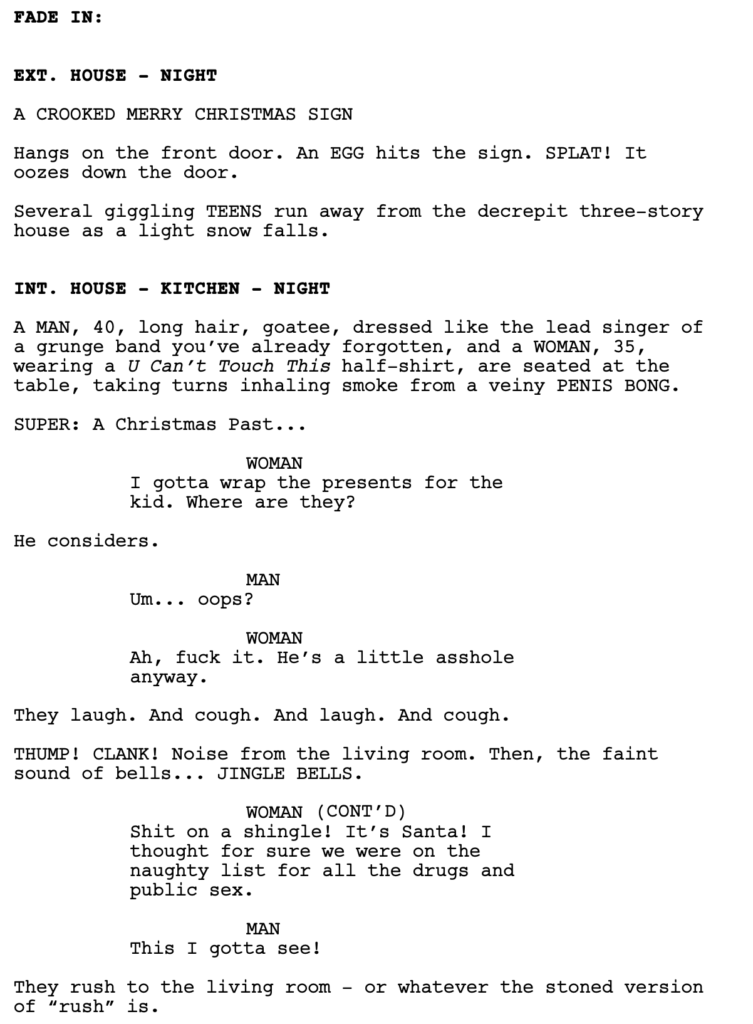
This is where screenwriting gets tricky. Here’s the writer’s pitch: “This is a Christmas horror comedy… I kinda love it… it’s like SCREAM meets ELF, but also a tribute to the fun 80’s horror movies I loved growing up like Night of the Demons, Return of the Living Dead, Night of the Creeps and Gremlins. It’s full of sex and violence and wrongness and fun.” It’s a fun pitch but the second I read this part — “Ah, f**k it. He’s a little a$$hole anyway.” They laugh. And cough. And laugh. And cough.” — I checked out. I hate these two people. It’s no different from a first impression. A girl could meet the man of her dreams but, if within the first five seconds, he accidentally spits on her while he’s talking, that’s all she sees. Any little mistake during a first impression has an outsized impact on the other person. Another thing to keep in mind is that comedy only starts working once you’ve established that type of comedy. If you have your highly sarcastic characters start off on page one saying sarcastic funny things, the reader doesn’t know they’re sarcastic yet! How could they? It’s the first page. So they may take their lines seriously. It’s only after being with the characters for 15-20 pages that we understand their sense of humor. So starting with a mean joke before you’ve established that as the dominant type of humor could turn off a lot of readers.
Logline (Horror/Comedy): After being fired by her not-so-jolly dad on Christmas Eve, a heartbroken Karen Claus discovers she’s the target of a masked killer grinch seeking revenge against Santa for the coal he received as a child.
TITLE: TRUTH, JUSTICE, AND THE AMERICAN WAY
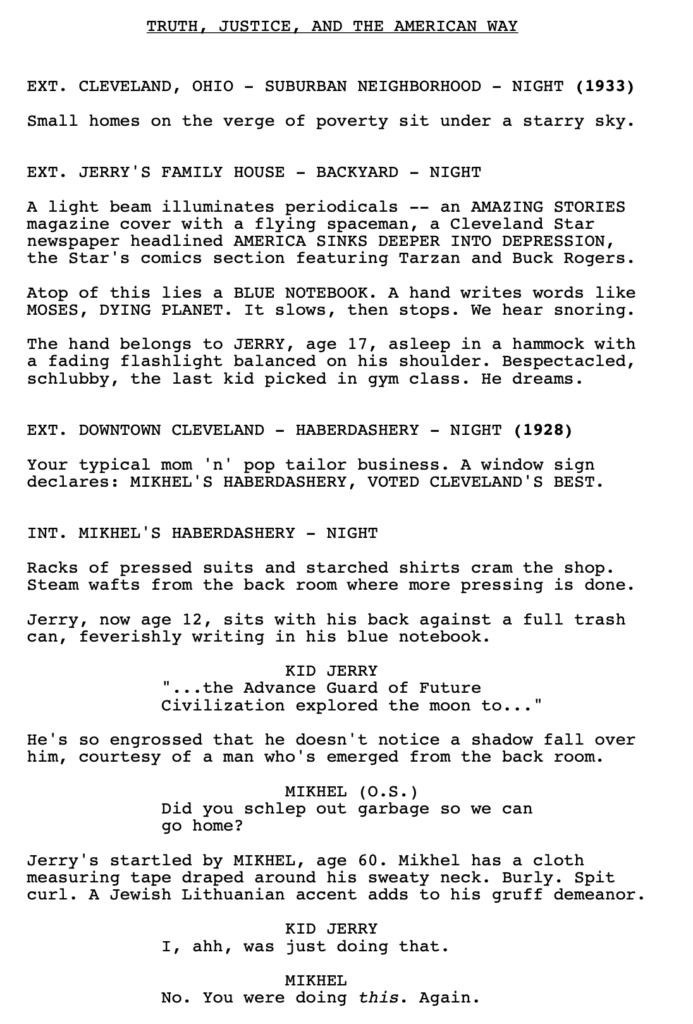
One thing you just can’t do is start your script with nothing happening then jump into a flashback. Why not just start in the flashback already????? What’s the point of seeing a person writing random words? Why is that worthy of creating a gummed up first scene with two time periods? It’s not. You don’t have time to mess around with screenplays. You’re always looking to get to the meat ASAP. Any time you’re not in the meat, you’re wasting the reader’s time. So if you are going to start with something before jumping into a flashback, make it a really big something where a lot is going on, not a small unimportant visual beat that leaves zero impression on the reader. Cause this is one of the few biopics I would probably be interested in. It’s the ultimate David vs. Goliath scenario. So use that first scene to grab us, not waste our time. You have freaking SUPERMAN for goodness sake. You’ll do yourself a huge favor by starting your first scene with Superman in it.
Logline (Biopic/Drama): The creators of Superman achieve the American dream, have it stolen, and fight like hell to regain it.
As always, I do logline consultations for $25! E-mail me at carsonreeves1@gmail to make sure you’re going into any e-mail query with your best logline.
